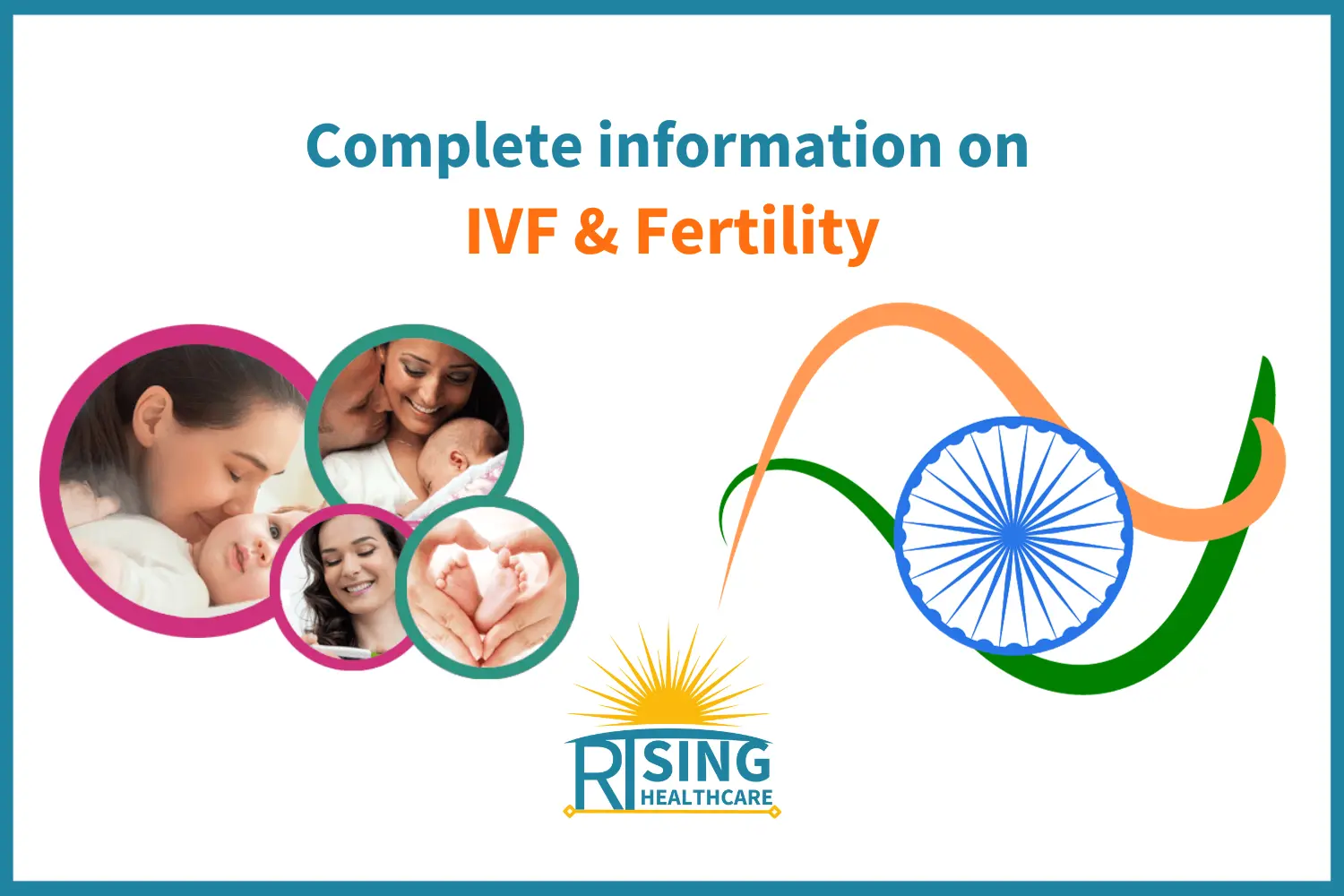
IVF and Fertility: A Comprehensive Guide
Introduction
Bringing a new life into the world is a dream for many, but for some couples, the journey to parenthood can be a challenging one. Infertility, a condition affecting millions of people worldwide, can make it difficult for couples to conceive naturally. In such cases, modern medical advancements offer hope in the form of In Vitro Fertilization (IVF). This comprehensive guide explores IVF and fertility, focusing on key aspects like fertility clinics, IVF treatment costs, and the science behind in vitro fertilization.
Contents
Understanding Fertility
Before we delve into the details of IVF, it’s essential to understand fertility. Fertility refers to a person’s ability to conceive and have a baby. For most couples, conception occurs naturally through sexual intercourse. However, when couples struggle to get pregnant despite regular, unprotected sex, it may indicate a fertility issue.
There can be various factors affecting fertility, such as age, underlying health conditions, lifestyle choices, and genetics. Infertility can affect both men and women, and it’s not uncommon. It’s estimated that around 10-15% of couples face fertility problems at some point in their lives.
Seeking Help at a Fertility Clinic
When couples encounter fertility challenges, seeking help from a fertility clinic is a crucial step towards fulfilling their dream of having a child. A fertility clinic is a specialized medical facility staffed with experts who can diagnose and treat infertility issues.
- The Fertility Clinic: The first keyword, “the fertility clinic,” refers to these specialized centers. These clinics are equipped with state-of-the-art technology and a team of healthcare professionals, including fertility doctors, reproductive endocrinologists, embryologists, and nurses, all dedicated to helping couples achieve pregnancy.
At a fertility clinic, you can expect:
- Comprehensive evaluation: Fertility specialists conduct thorough examinations and tests to determine the cause of infertility.
- Personalized treatment plans: Based on the diagnosis, the clinic will develop a tailored treatment plan.
- Fertility treatments: Fertility clinics offer a range of treatments, including IVF, to address infertility.
In Vitro Fertilization (IVF) Explained
IVF is a groundbreaking fertility treatment that has helped countless couples worldwide become parents. This process involves fertilizing an egg with sperm outside the body, in a laboratory setting, hence the term “in vitro,” which means “in glass” in Latin.
- In Vitro Fertilization (IVF): Let’s explore the keyword “in vitro fertilization” in detail. IVF is a multi-step process:a. Ovarian Stimulation: The woman takes medications to stimulate the ovaries to produce multiple eggs. b. Egg Retrieval: Once the eggs are mature, a minor surgical procedure is performed to collect them. c. Sperm Collection: The male partner provides a sperm sample, which is then prepared in the lab. d. Fertilization: The sperm and eggs are combined in a lab dish to facilitate fertilization. e. Embryo Culture: Fertilized eggs develop into embryos, which are monitored and cultured in the lab. f. Embryo Transfer: The healthiest embryos are selected and transferred into the woman’s uterus. g. Pregnancy Test: After a waiting period, a pregnancy test is conducted to confirm if the procedure was successful.
IVF offers hope to couples facing a wide range of infertility issues, including blocked fallopian tubes, low sperm count, ovulation disorders, and unexplained infertility.
IVF Treatment Cost
- One crucial aspect that often concerns couples considering IVF is the cost. IVF treatment costs can vary widely based on several factors:
- IVF Treatment Cost: Let’s dive into the keyword “IVF treatment cost” and discuss what influences it:a. Geographic Location: The cost of IVF can vary depending on where you live. In larger cities or metropolitan areas, the cost might be higher due to the cost of living and demand for fertility services.b. Clinic Reputation: Established, well-known fertility clinics may charge higher fees compared to smaller or newer clinics.
c. Treatment Complexity: The specific treatment plan, medications, and procedures involved can affect the overall cost. Some individuals may require additional treatments, such as pre-implantation genetic testing (PGT) or egg/sperm freezing, which can add to the expenses.
d. Insurance Coverage: Some insurance plans may cover a portion of the IVF costs, while others may not cover it at all. It’s essential to check with your insurance provider to understand what is covered.
e. Number of Cycles: Success rates for IVF can vary, and some couples may need multiple IVF cycles to achieve pregnancy. Each cycle incurs its own set of costs.
f. Medication Costs: Medications used for ovarian stimulation and embryo implantation can be a significant expense. Generic or brand-name medications can also impact the overall cost.
g. Additional Services: Some clinics offer additional services like counseling, acupuncture, or support groups, which can add to the overall cost.
h. Financing Options: Many fertility clinics offer financing plans to help ease the financial burden. It’s essential to inquire about these options.
- IVF Treatment Cost: Let’s dive into the keyword “IVF treatment cost” and discuss what influences it:a. Geographic Location: The cost of IVF can vary depending on where you live. In larger cities or metropolitan areas, the cost might be higher due to the cost of living and demand for fertility services.b. Clinic Reputation: Established, well-known fertility clinics may charge higher fees compared to smaller or newer clinics.
IVF Success Rates and Factors
While IVF offers hope, it’s essential to understand that success rates can vary from one couple to another. Several factors can influence the chances of a successful IVF treatment:
- Age: Age is a significant factor in IVF success. Women under 35 tend to have higher success rates, while success rates decline as a woman’s age increases.
- Underlying Health Conditions: Certain medical conditions, such as polycystic ovary syndrome (PCOS) or endometriosis, can affect IVF success.
- Lifestyle Factors: Lifestyle choices, such as smoking, excessive alcohol consumption, and obesity, can impact the outcome of IVF.
- Male Factor Infertility: Issues with sperm quality and quantity can affect fertilization rates. In such cases, intracytoplasmic sperm injection (ICSI) may be recommended.
- Embryo Quality: The quality of embryos used in IVF plays a crucial role in success. PGT can help select the healthiest embryos.
- Previous Pregnancy History: A couple’s history of previous pregnancies, miscarriages, or live births can also impact IVF success.
Emotional and Psychological Considerations
The journey through infertility and IVF can be emotionally challenging. It’s important for couples to acknowledge and address the emotional and psychological aspects of the process:
- Stress and Anxiety: The emotional toll of infertility and IVF can lead to stress and anxiety. It’s crucial to seek support through counseling or support groups.
- Coping Strategies: Developing healthy coping strategies, such as mindfulness, meditation, or yoga, can help manage the emotional challenges.
- Communication: Open and honest communication between partners is vital during this journey. It’s important to support each other and share feelings and concerns.
- Support Network: Building a support network of friends and family who understand and empathize with the struggles can provide emotional strength.
- Self-Care: Taking care of one’s physical and emotional well-being is essential. Engaging in activities that bring joy and relaxation can help alleviate stress.
Risks and Complications
Like any medical procedure, IVF carries certain risks and potential complications:
- Ovarian Hyperstimulation Syndrome (OHSS): In some cases, the ovaries may become overstimulated, causing discomfort and fluid retention.
- Multiple Pregnancies: IVF increases the likelihood of having twins, triplets, or more, which can lead to higher risks during pregnancy and childbirth.
- Ectopic Pregnancy: IVF raises the risk of ectopic pregnancies, where the embryo implants outside the uterus.
- Emotional Stress: The emotional toll of IVF can be significant, and couples should be prepared for the ups and downs of the process.
- Financial Strain: The cost of IVF can be a financial burden for many couples.
Conclusion
In vitro fertilization (IVF) is a remarkable advancement in modern medicine that has brought the joy of parenthood to countless couples facing infertility challenges. While it offers hope and the potential for success, it’s essential to approach the journey with realistic expectations, considering factors like the fertility clinic you choose, IVF treatment costs, and the emotional and psychological aspects of the process.
Ultimately, the path to parenthood through IVF may be challenging, but it has paved the way for countless dreams to come true. Couples should seek guidance from fertility clinics, explore treatment options, and create a support network to navigate this remarkable journey towards building their families.

